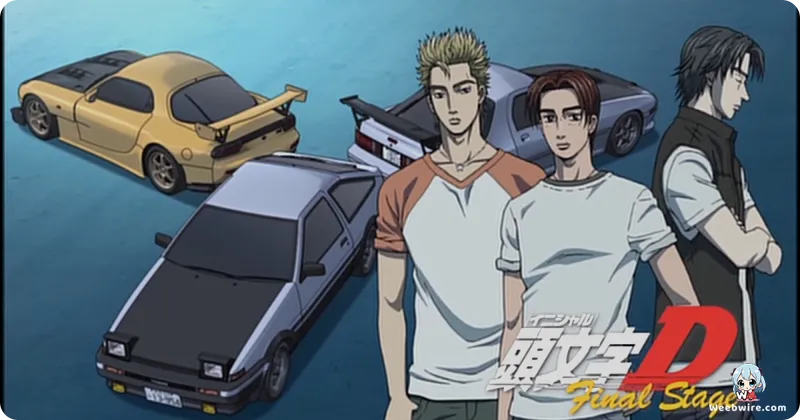Initial D Final Stage: Unpacking the Legendary Conclusion and Lasting Impact of an Anime Phenomenon

As the final checkered flag waved, Initial D Final Stage delivered an unforgettable conclusion to Takumi Fujiwara's illustrious racing saga, solidifying its status as a global cultural touchstone. Far beyond a mere collection of exhilarating downhill battles, this ultimate installment brims with captivating details and a profound influence that transcends the animated screen. While fans universally recall the iconic AE86 and the pulse-pounding Eurobeat, a deeper dive unearths fascinating layers that underscore its enduring appeal and impact.
Realistic Driving Techniques
A hallmark of Initial D Final Stage, and indeed the entire series, is its unparalleled dedication to realistic driving techniques. Unlike many racing narratives that prioritize spectacle, creator Shuichi Shigeno, a devoted car enthusiast, meticulously integrated real-world physics and strategic driving into every race. In Final Stage, this commitment reached its pinnacle, showcasing advanced maneuvers like the 'blind attack' and a nuanced understanding of tire dynamics. Takumi's climactic confrontation with Shinji Inui, another AE86 prodigy, was a masterclass in refined technique, where every turn, drift, and acceleration was grounded in authentic driving principles. Both enthusiasts and professional drivers have lauded the series for its accuracy, crediting it with educating a generation on the intricacies of mountain pass racing and the art of drifting.
The Indelible Eurobeat Soundtrack
The indelible Eurobeat soundtrack remains a cornerstone of the Initial D experience, and Final Stage ensured this tradition pulsated with explosive energy. Far from mere background music, the high-octane Eurobeat tracks are intrinsically woven into the series' identity, functioning as a dynamic narrative tool that amplifies the intensity and emotional weight of each race. Artists such as m.o.v.e. became synonymous with the franchise, their songs evolving into anthems for street racing aficionados worldwide. The deliberate choice of Eurobeat, with its rapid tempos and driving rhythms, perfectly mirrored the adrenaline and speed of the downhill duels, crafting an immersive auditory landscape unmatched in anime. For Final Stage, the curated selection of tracks provided an epic and nostalgic send-off, ensuring the series' signature sound accompanied Takumi to his ultimate triumph.
Takumi's Iconic AE86
Takumi's legendary Toyota Sprinter Trueno AE86 is arguably the most celebrated car in anime history, and Initial D Final Stage cemented its mythical status. What began as a humble tofu delivery vehicle, piloted by a seemingly indifferent high school student, transformed into an iconic racing machine capable of outperforming far more powerful and technologically advanced rivals. The AE86's lasting appeal stems from its underdog narrative and Takumi's extraordinary ability to master its limitations, converting them into formidable strengths. Final Stage showcased the car's capabilities one last time, illustrating how a perfectly balanced, lightweight vehicle, combined with an unparalleled driver, could achieve astonishing feats. The series single-handedly ignited a global resurgence of interest in the AE86, making it a coveted collector's item and a powerful symbol of grassroots racing passion.

Animation and Visuals by SynergySP
Animation studio SynergySP, which helmed Initial D Final Stage, played a pivotal role in vividly bringing the concluding chapters to life with refined visual flair. Throughout the extensive run of the Initial D anime, the integration of 3D CG for car models saw significant evolution. By Final Stage, SynergySP employed advanced CG techniques to render vehicles with impressive detail and fluidity, enabling dynamic camera angles and breathtaking race sequences that felt more immersive than ever. This visual progression was crucial for a series where the cars are as vital as the drivers themselves, ensuring the final battles were not only strategically deep but also visually spectacular, providing a satisfying graphical crescendo to Takumi's journey. The studio's work achieved a seamless fusion of traditional character animation with cutting-edge vehicle rendering.
Takumi Fujiwara's Evolution
Initial D Final Stage transcended simple races; it encapsulated the culmination of Takumi Fujiwara's profound personal evolution as a driver. Throughout the series, Takumi transformed from an unwitting prodigy, whose driving prowess initially stemmed from daily tofu deliveries, into a self-aware master of the mountain passes. In Final Stage, his growth reached its zenith. He no longer relied solely on instinct but demonstrated an acute understanding of car mechanics, track conditions, and opponent psychology. His ultimate battle against Shinji Inui, a driver possessing similar innate talent and an AE86, served as both a symbolic passing of the torch and a definitive test of Takumi's fully realized potential. This narrative depth, charting a protagonist's journey from raw talent to refined mastery, is a key factor in the series' lasting emotional resonance.
Cultural Impact and Legacy
The cultural impact of Initial D is undeniable, and Final Stage served as a powerful capstone to this global phenomenon. The series not only popularized drifting worldwide but also fostered immense appreciation for JDM (Japanese Domestic Market) cars and tuner culture. It inspired countless individuals to explore motorsport, delve into car modifications, and even seek out the real-life mountain passes depicted in the anime. Initial D forged a vibrant community of enthusiasts, and Final Stage provided a definitive closure for that community, celebrating their shared journey. Its legacy continues to influence car culture and anime fans, proving that a story about street racing could transcend its genre to become a true icon. The series remains a testament to the power of passion, skill, and the thrill of the open road, forever etched into the annals of anime and automotive history.
Credits
Initial D Final Stage
Author
Shuichi Shigeno
Cover Art
Shuichi Shigeno
Studio
SynergySP
Publisher
Kodansha
Producers





